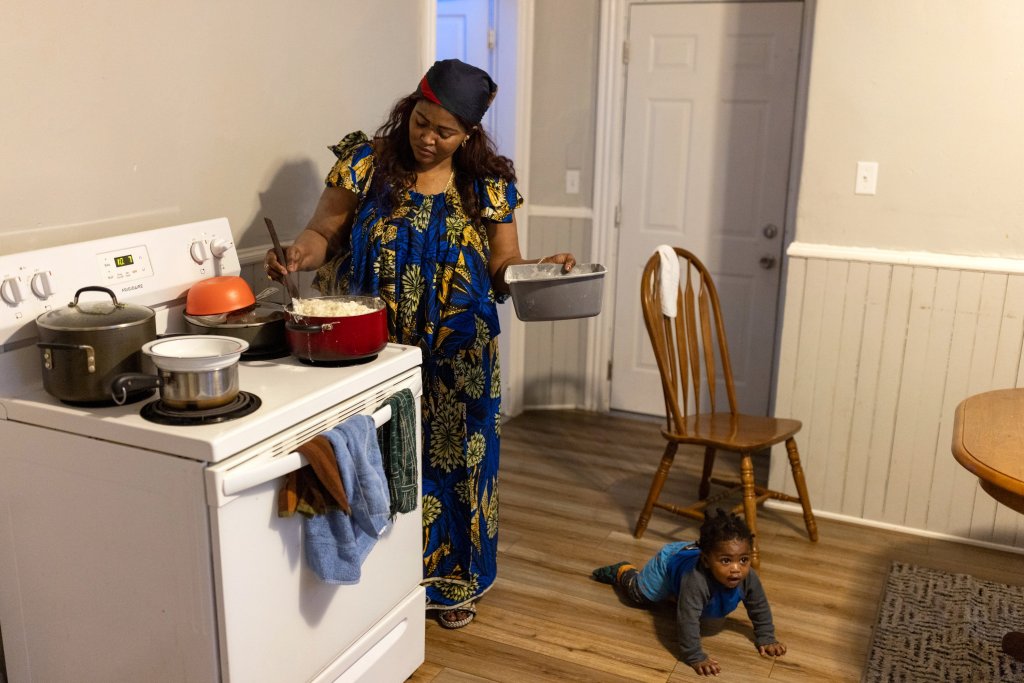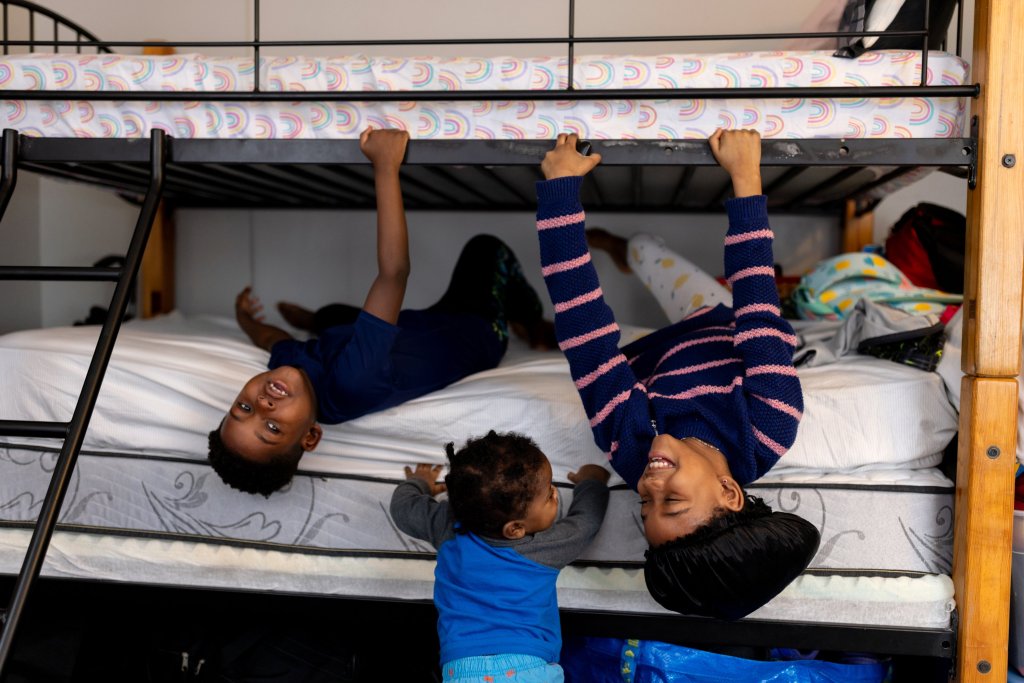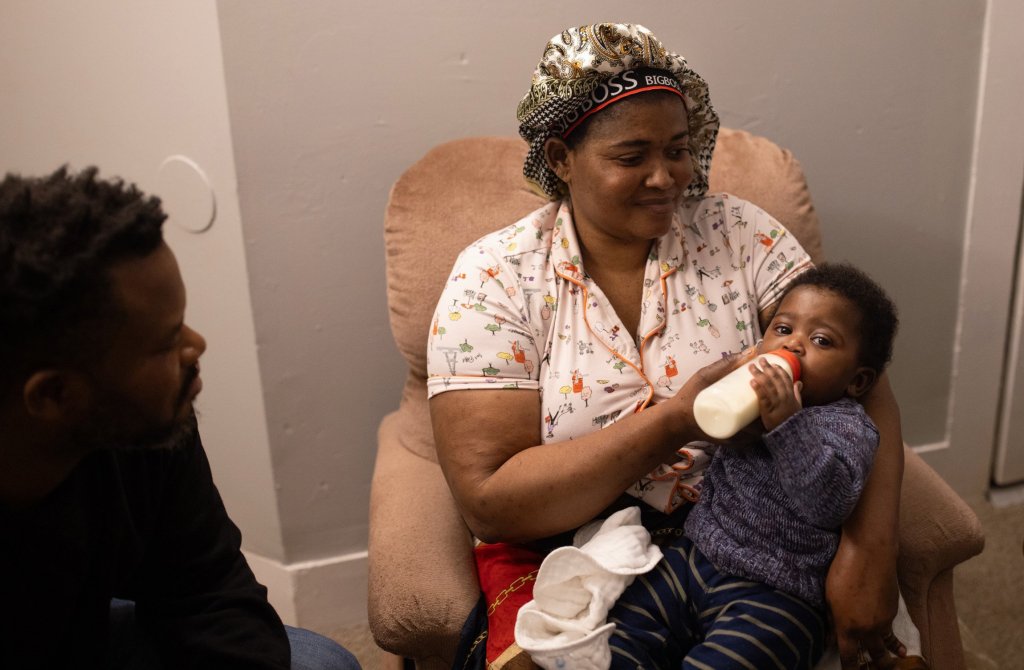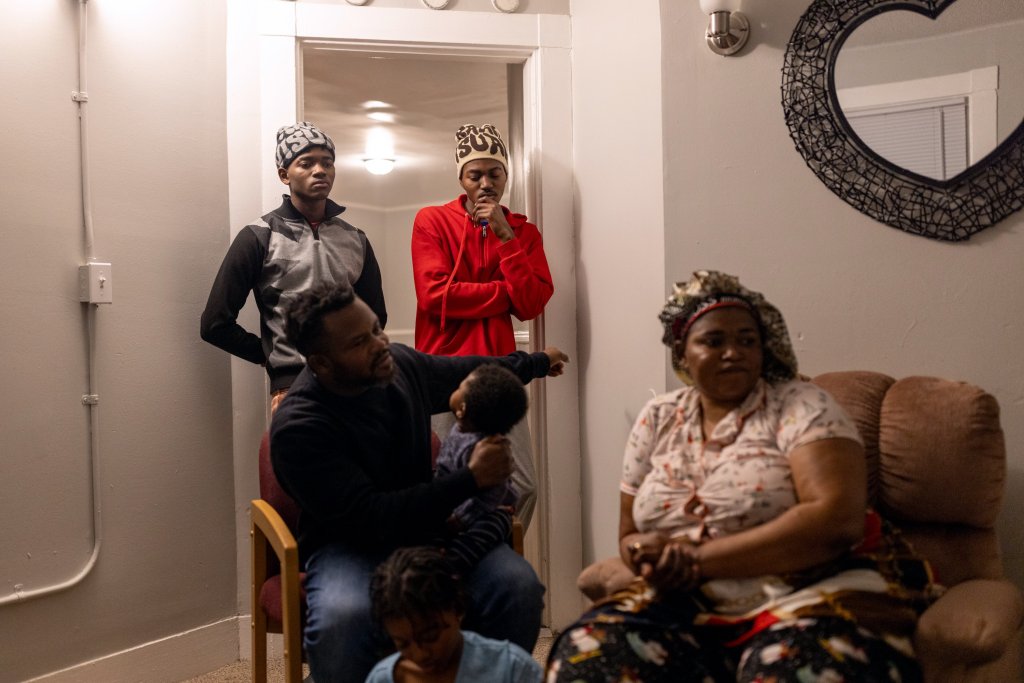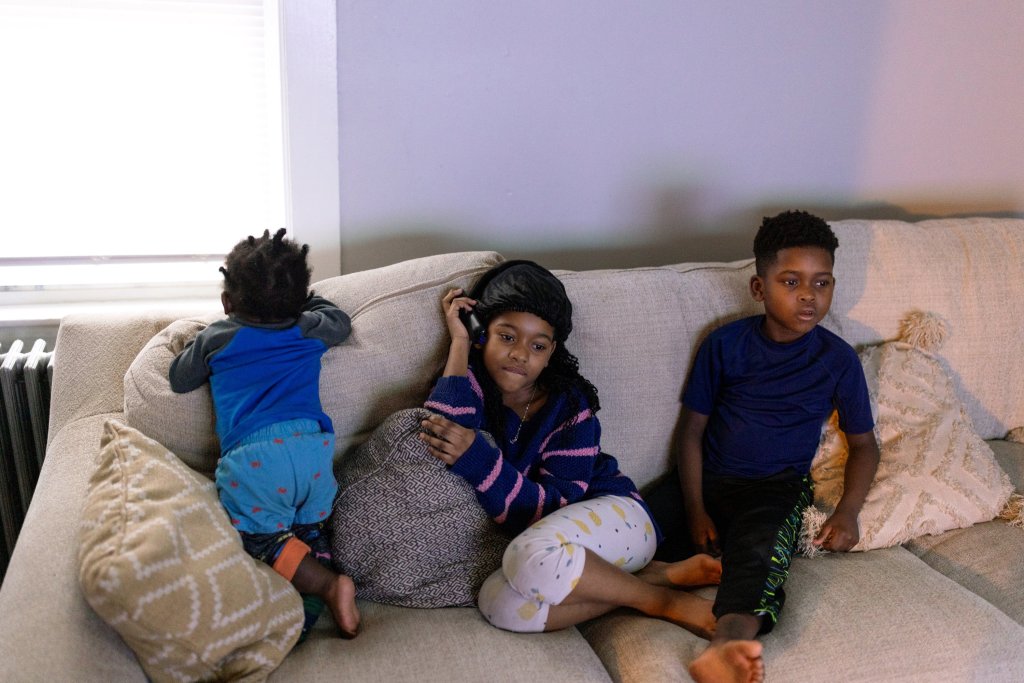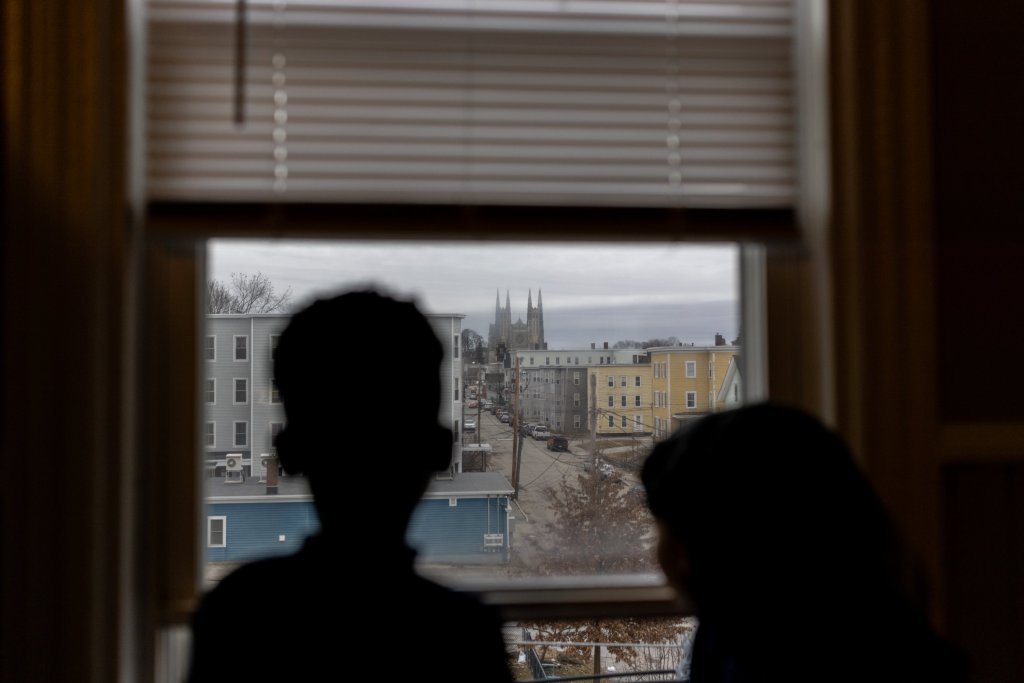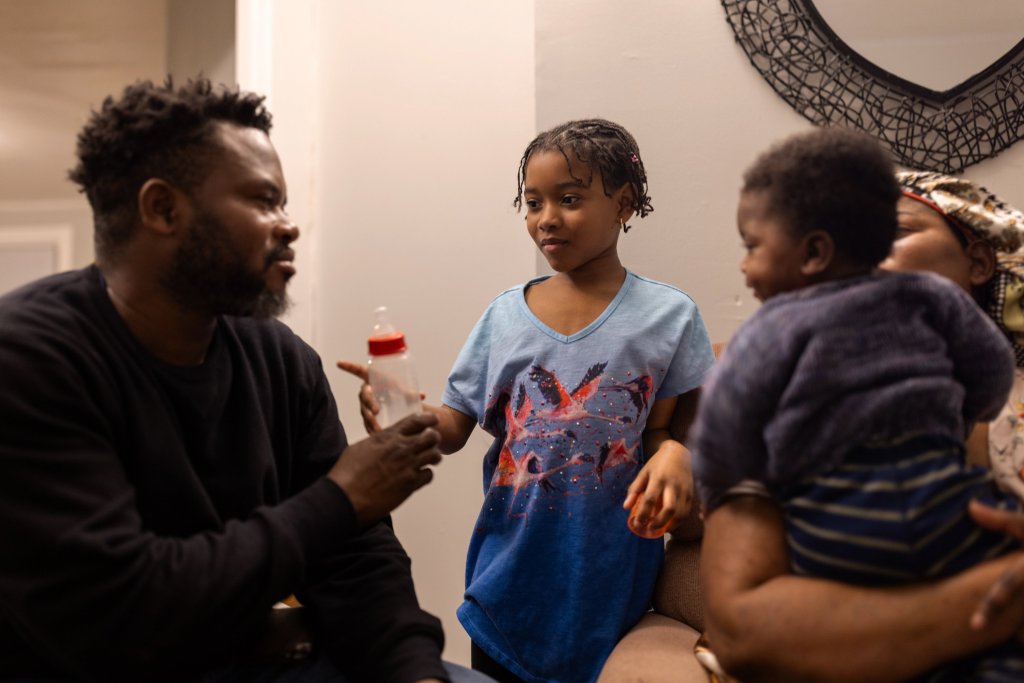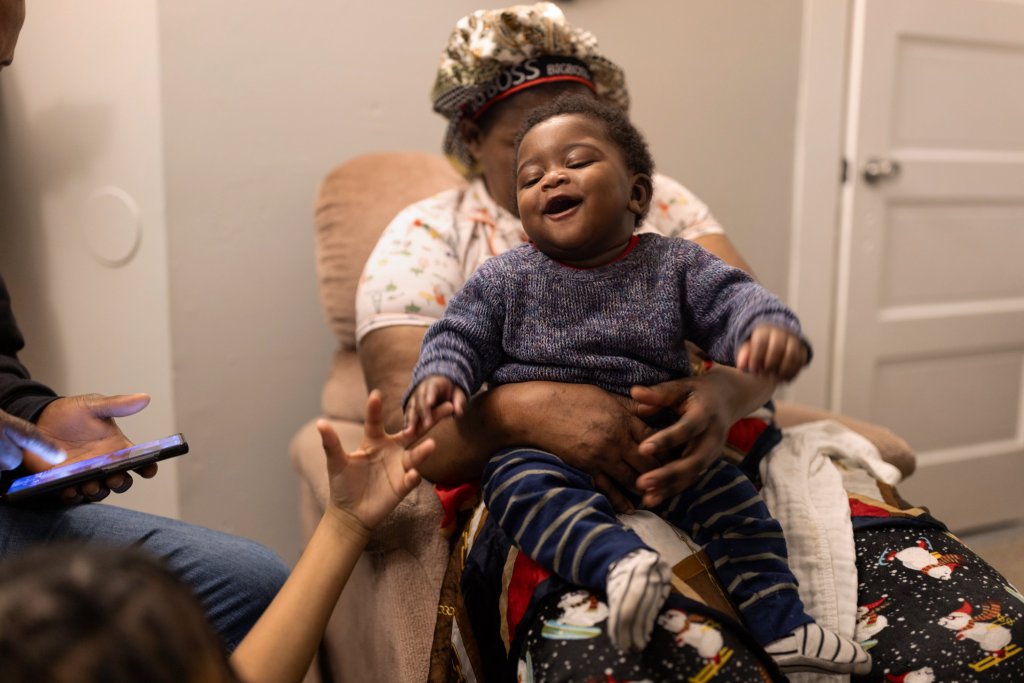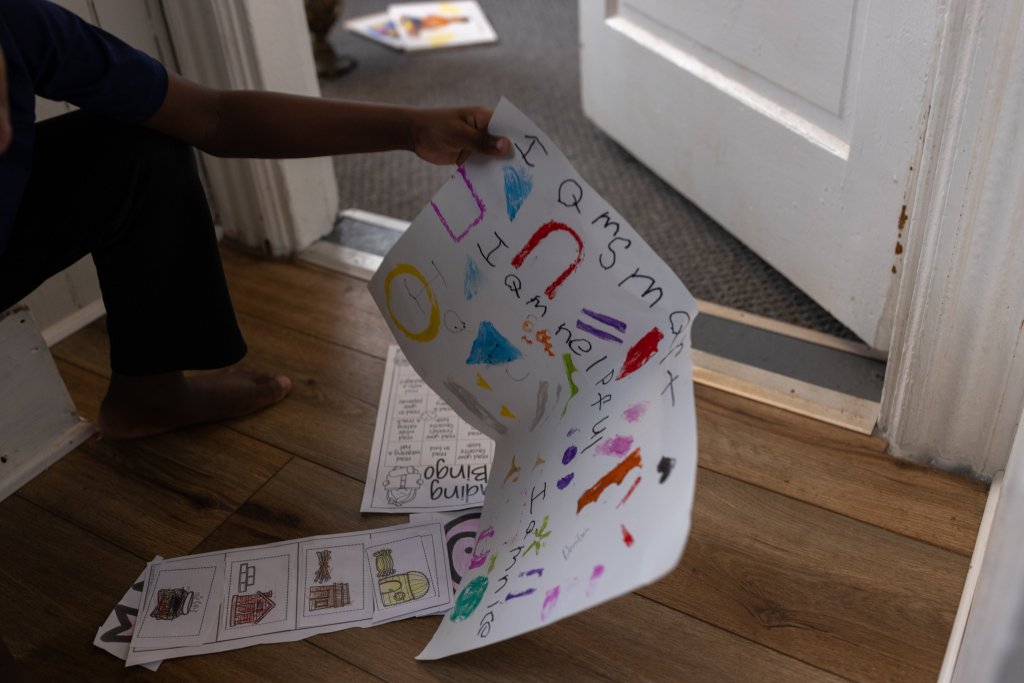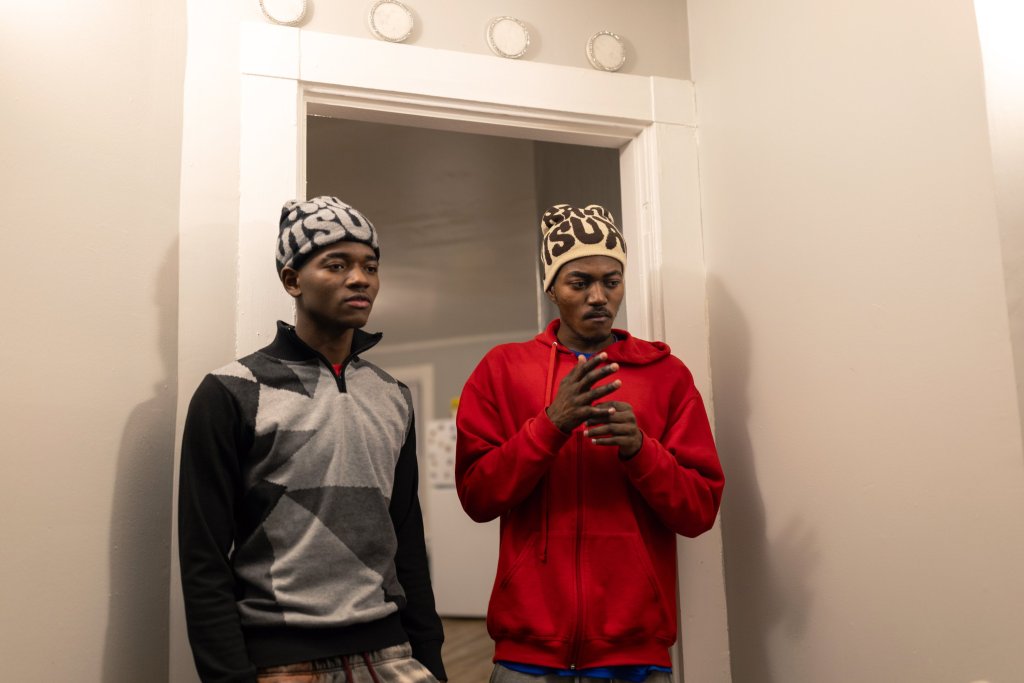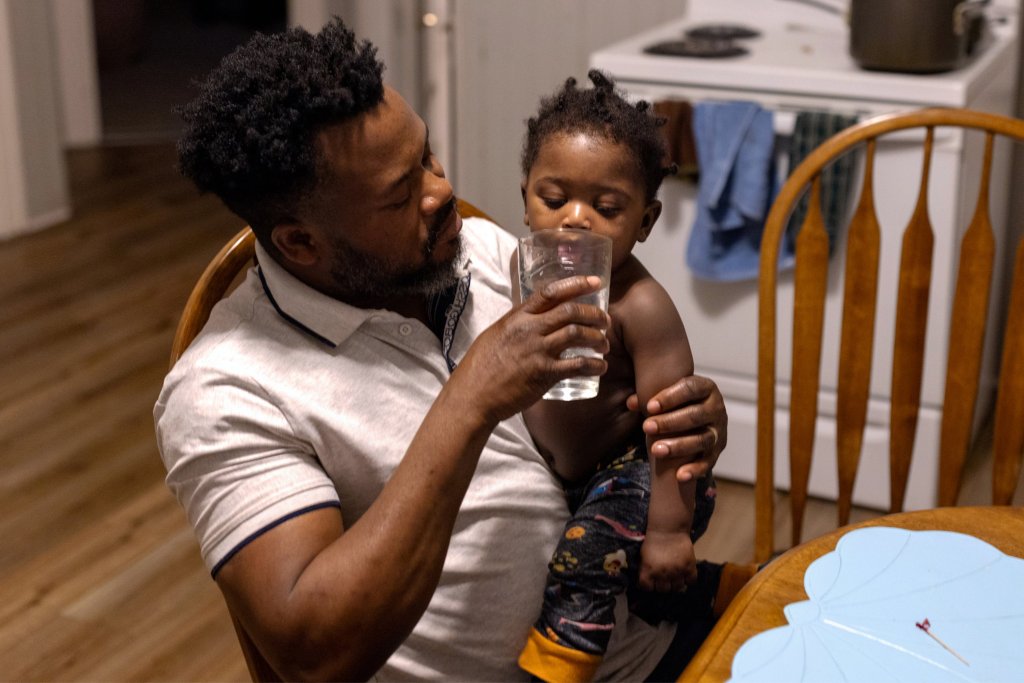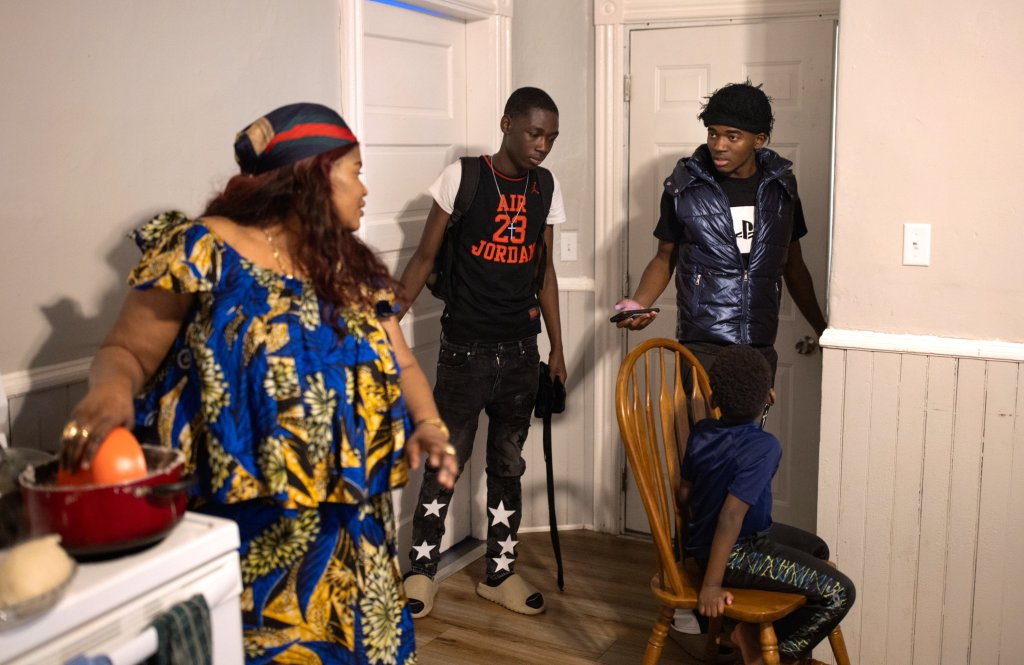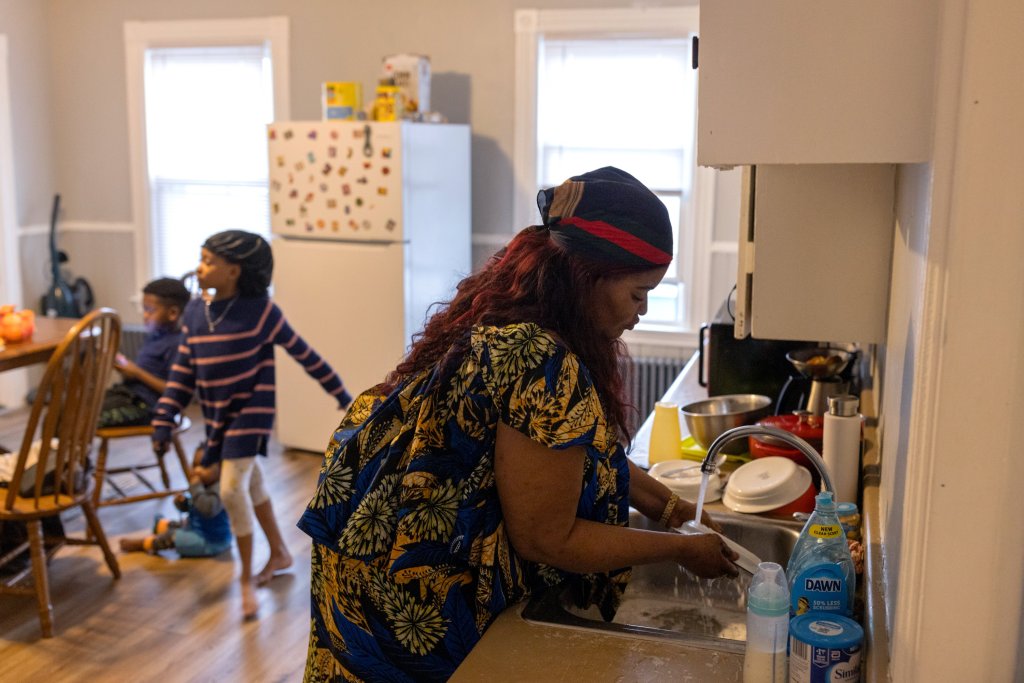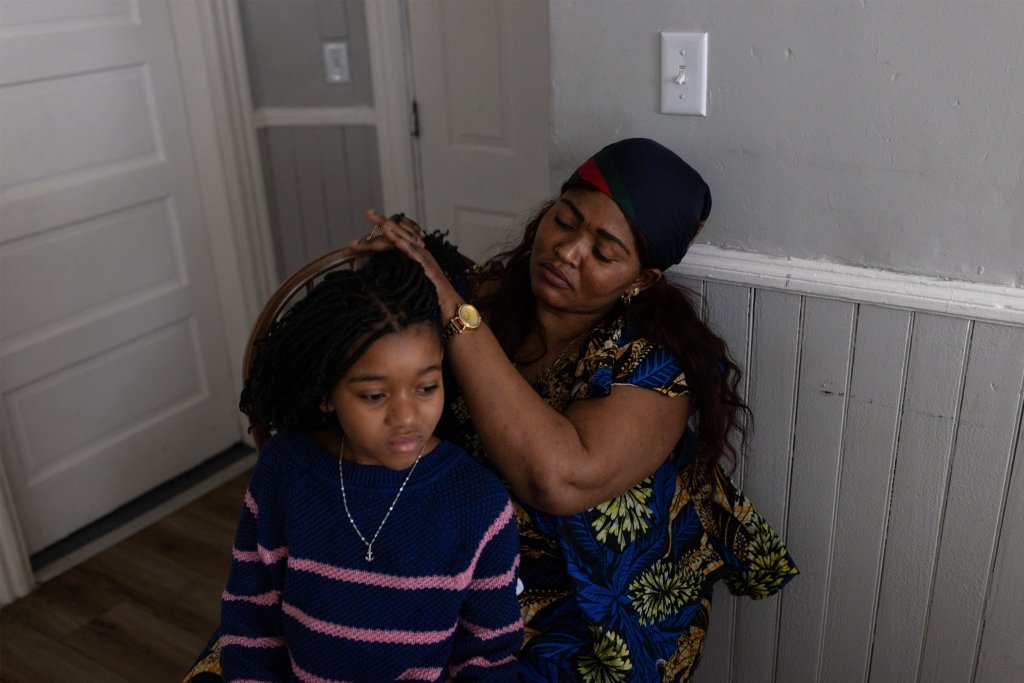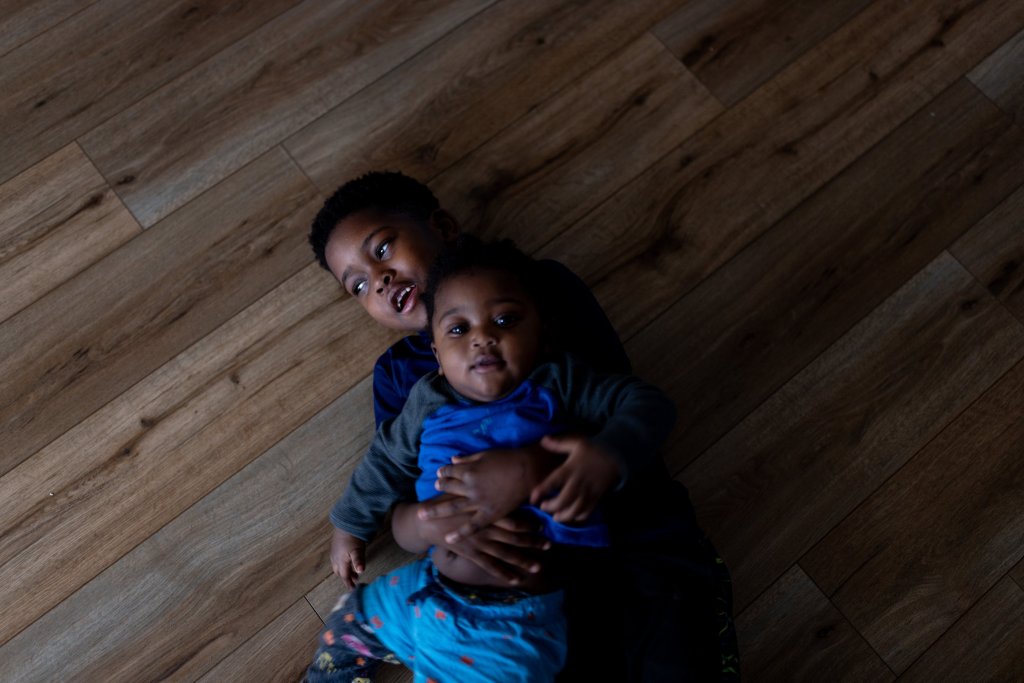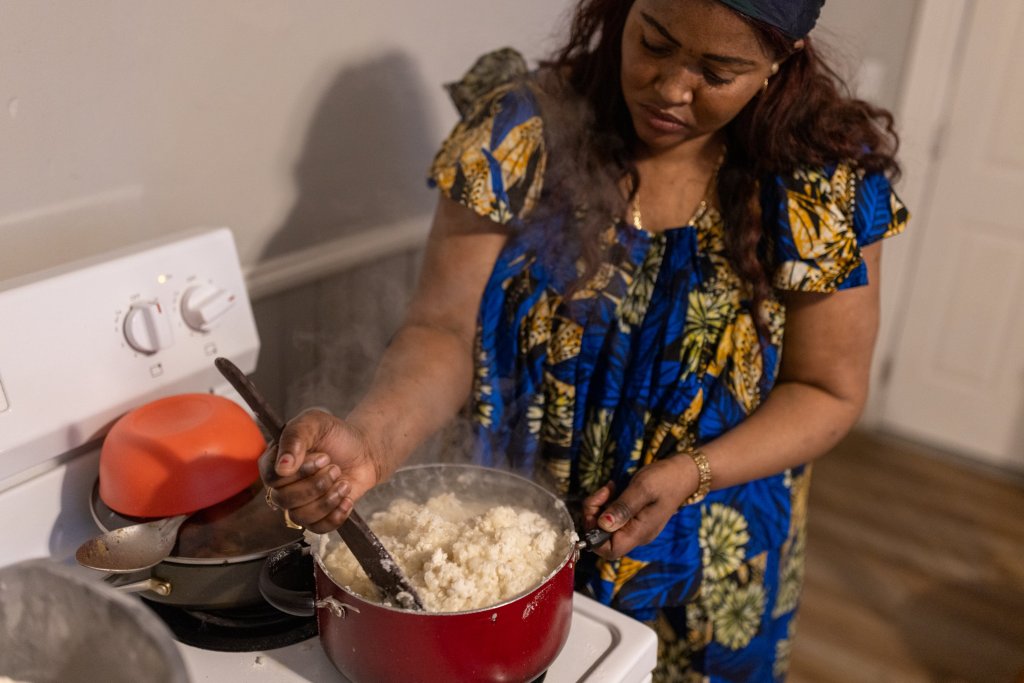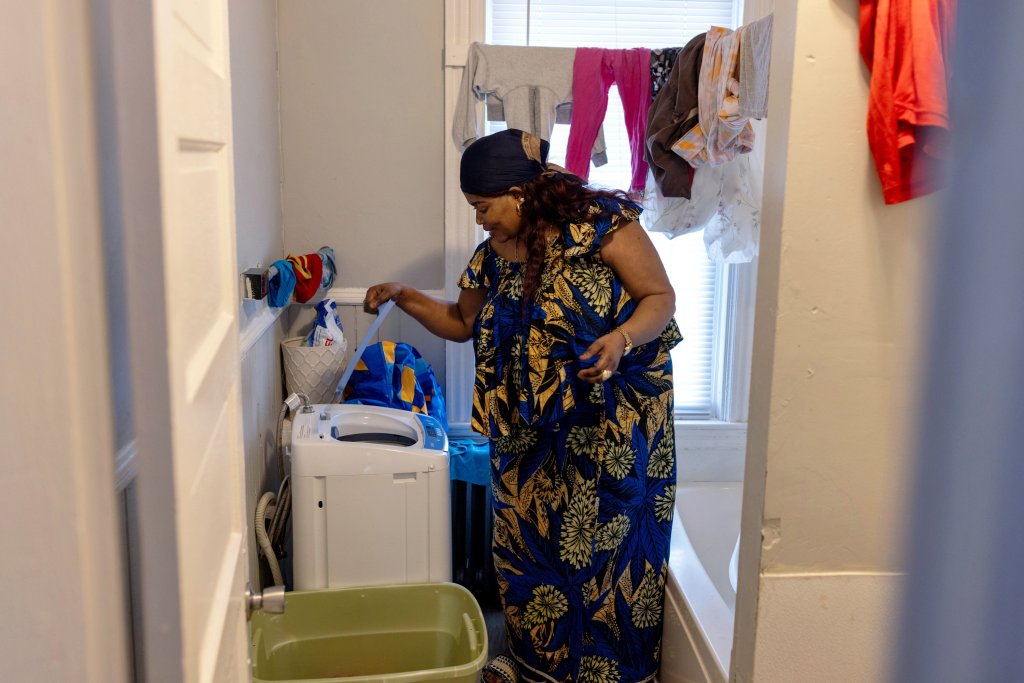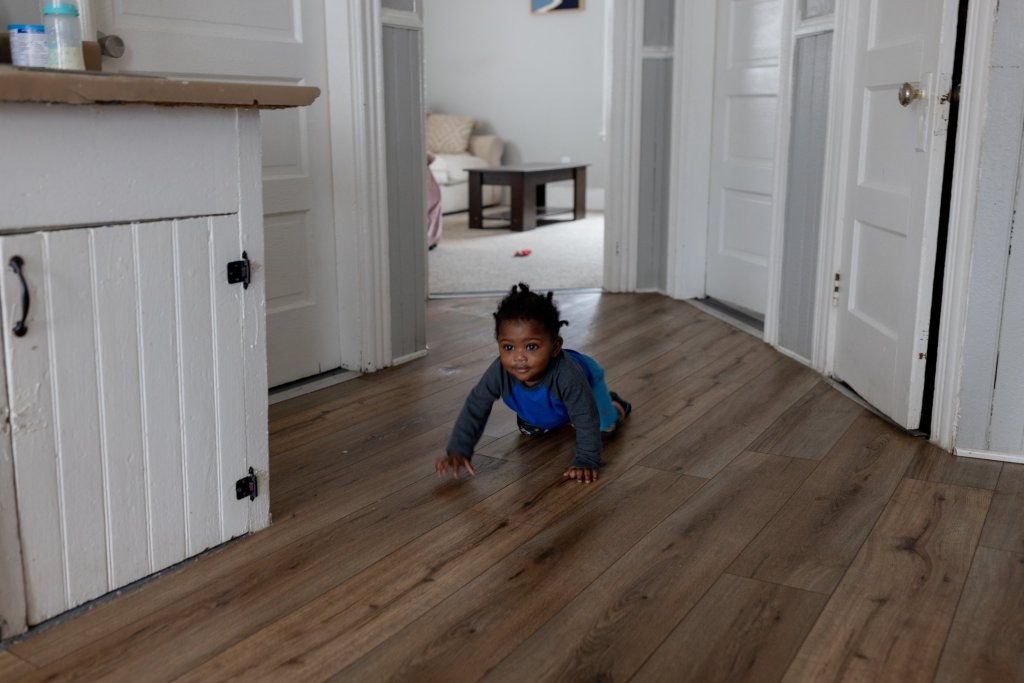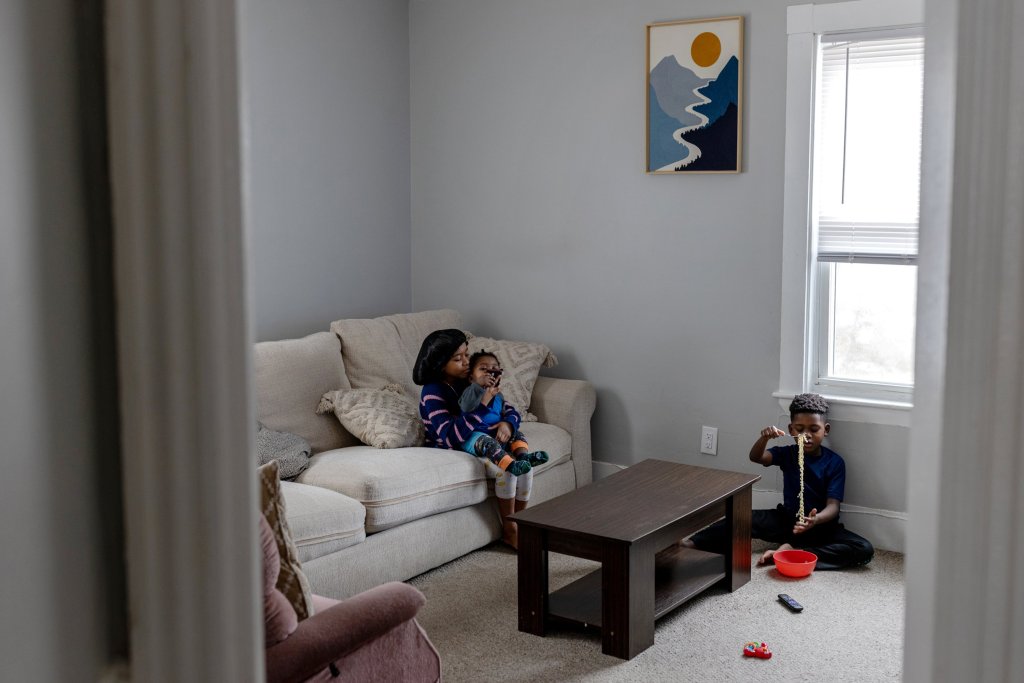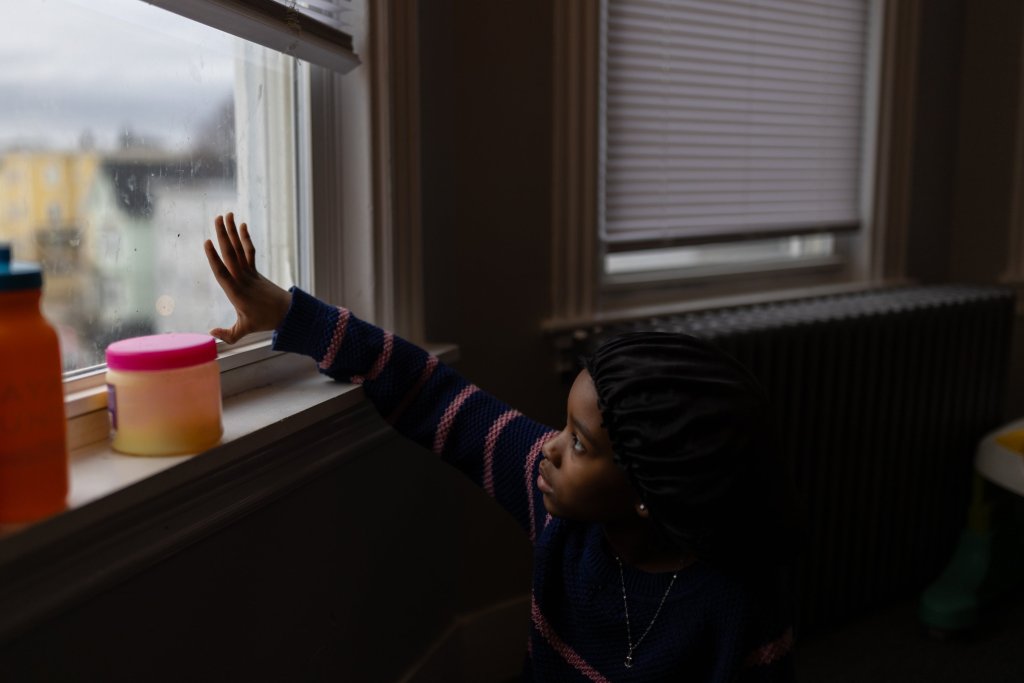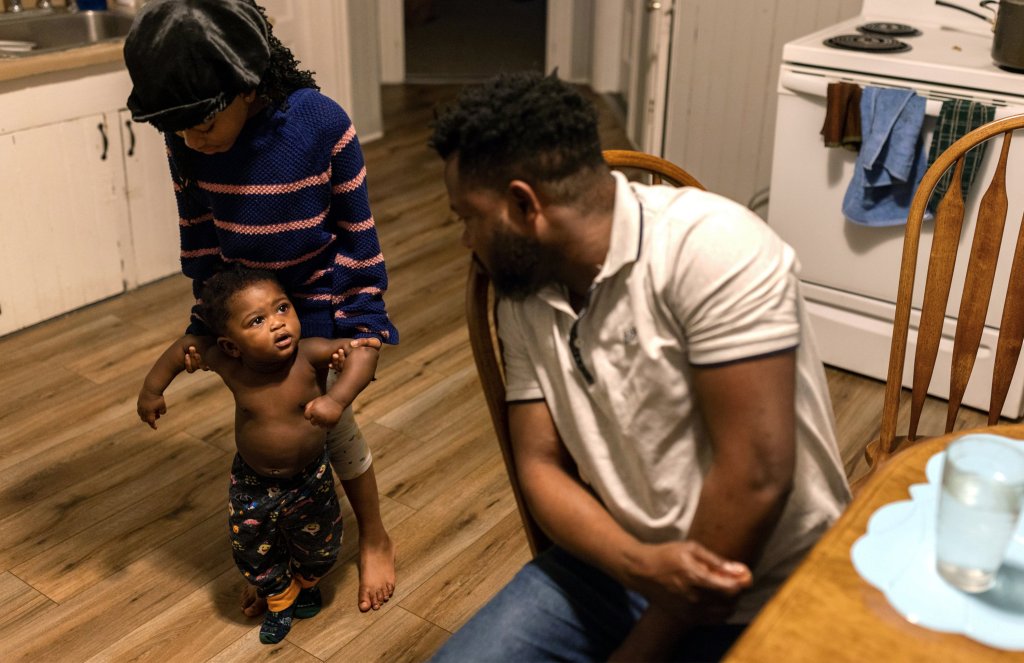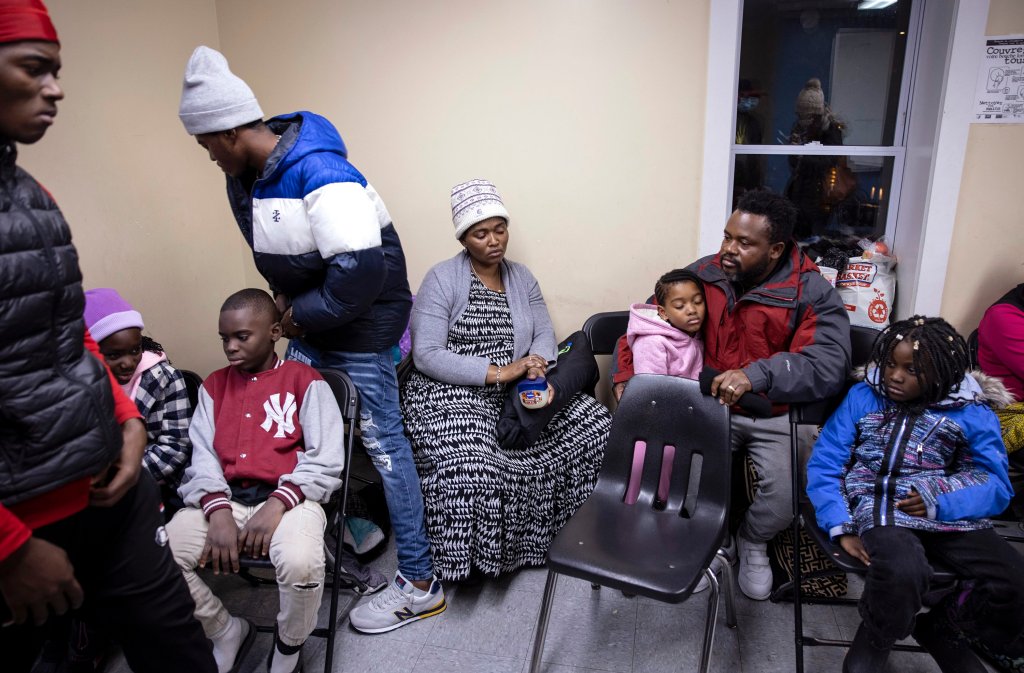LEWISTON — The water in the red enamel pot starts to bubble, and Anadia Miguel slowly stirs in a white powdery mixture of semolina wheat flour and cassava root flour.
She’s making fufu, a doughy, mashed potato-like food that she learned to prepare as a girl in West Africa. Her family will eat the fufu with their evening meal, scooping up flavorful bites of stewed vegetables and fish.
Her spacious kitchen is the center of her six-room apartment on Birch Street – an old-fashioned, four-story walk-up where immigrants and their descendants have lived for more than 100 years. Her French Canadian predecessors made buckwheat pancakes called ployes. The Irish made soda bread.
A year ago, Anadia Miguel was in a very different place. Seven months pregnant, she was uncomfortable and inconsolable in an emergency shelter for asylum seekers at State Street Church in Portland. All she wanted was a home. Her husband, Pedro Miguel, was doing everything he could to find an apartment amid a housing crisis before the baby arrived, without success.

Pedro Miguel, second from right, holds his daughter, Djamila, 7, as she dozes off in the chairs they slept in at the Family Shelter in Portland on Feb. 9, 2023. At the time, the Miguels were one of the dozen or so families that were sleeping upright in chairs in the overflow room at the Family Shelter in February because the city was out of shelter space. Brianna Soukup/Staff Photographer, file
The Miguels were among 1,600 migrants, mostly from Angola and the Democratic Republic of Congo, who arrived in Portland from the southern border in the first half of 2023.
The city’s family shelter overflowed, and the state stepped in to support temporary shelters at the church, Salvation Army, Portland Expo and area hotels, as well as new subsidized apartment complexes in South Portland and Brunswick.
Portland officials say migrants continue to arrive, but in smaller numbers. The city is currently providing shelter to 470 asylum seekers – 134 in the family shelter, 179 at the shelter for single asylum seekers that opened in November, and 157 at Motel 6.
It’s unclear why fewer asylum seekers are arriving in Maine now. The numbers ebb and flow as people respond to untold geopolitical and socioeconomic forces. Migrants seeking safety are sometimes motivated to come to Maine through tips and assistance they get upon entering the country.

Djamila, 8, right, and Denilson, 6, look out the window of their apartment in Lewiston. Brianna Soukup/Staff Photographer
New arrivals aren’t being tracked as they move out into the community and receive help with rent, food and other basic needs through municipal General Assistance offices across southern and central Maine. Gov. Janet Mills has asked the Legislature to create an Office of New Americans to collect data about asylum seekers and other immigrants settling in Maine and help them enter the state’s workforce.
Like many who came to Lewiston before, the Miguels are an ocean away from their native country. The family of six – with the seventh on the way, at the time – fled political persecution in Angola more than a year ago, traveling through Brazil, Nicaragua, Mexico and California before arriving in Maine. Along their journey they crossed many rivers, narrowly escaping death, and spent several months in temporary shelters in Portland.
Finally, last summer they found a home here, in this city of immigrants on the Androscoggin River.

Anadia Miguel feeds her youngest child, 9-month-old Avelin, while her husband, Pedro Miguel, left, and her daughter, Djamila, right, watch at their apartment in Lewiston in mid-December. Brianna Soukup/Staff Photographer
“I had the baby, and two weeks later, we had an apartment,” Anadia says, speaking in her native Lingala through an interpreter.
Now, as she cooks, Anadia keeps an eye on 9-month-old Avelin as he scoots across the kitchen floor. She seems content, even happy. Built in 1900, the 10-unit apartment building is a bit run-down, but their apartment is clean and warm.
Pedro Miguel has a job. Their four older children are attending Lewiston public schools. And they finally have a kitchen table and chairs, donated and delivered by a community group in December.
“I am happy because I am alive,” says Anadia, 36. “It wasn’t safe for us before. Here, we are safe.”

Djamila, 8, and Denilson, 6, play with their little brother Avelin, 9 months, in the room they share at their apartment in Lewiston. Brianna Soukup/Staff Photographe
LEARNING THE ROPES
It’s late afternoon, and Anadia Miguel is ready to receive company in a vibrant blue floral print dress, or libáyá.
On the stove are some of her best dishes to serve with the fufu: salt fish sautéed with onion, cassava leaf and catfish stew, and fumbwa, a stew made with wild spinach, smoked fish and peanut butter.
“I love cooking,” she says. “I would like to work in a restaurant that makes both African and American food.”
Just home from Lewiston High School, her oldest children, sons Manosse, 16, and Enoc, 18, are in their rooms playing video games and watching television, respectively.
Djamila, 8, and Denilson, 6, are in third grade and kindergarten at Connors Elementary School. Curious about the visitors from the newspaper, they each eagerly write their name and age in the reporter’s notebook. They help mind their younger brother and show off the bunk beds in their room. After some family members went without beds for several months, they all have regular or air mattresses.

Anadia Miguel does daughter Djamila’s hair at their dining room table in Lewiston on March 6. Miguel has four sons and one daughter. Brianna Soukup/Staff Photographer
“The children are so happy here, and they are speaking English so well,” Anadia says. “But for (Pedro and me), it’s so hard.”
Anadia rarely leaves their fourth-floor apartment, except to take the baby to medical appointments, attend meetings with her children’s teachers or take weekly English classes through Lewiston Adult Education.
Learning English is critical on the path to citizenship, a complicated legal process that can take several years for asylum seekers, especially with a backlog of more than 1.5 million pending asylum cases in the U.S., according to the National Immigration Forum. The number of cases in Maine is estimated to be over 10,000.
“Language is very important,” she says. “Without English, you can’t do anything.”
Her husband usually shops for the family, sometimes borrowing a car from a friend to go to an African market, supermarket or Walmart. The family also attends a church in Portland on Sundays, when they have a ride.
One of Anadia’s more challenging tasks is doing laundry for seven people without a washer or dryer in their apartment or building. Someone gave them a small clothes washer, about the size of a kitchen trash can, but now it’s not working, and they don’t know how to fix it. The nearest laundromat is a block away, but that’s too far to walk every day and carry laundry there and back with a baby in tow.

Anadia Miguel in the bathroom of the apartment, where she also does the family’s laundry. Brianna Soukup/Staff Photographer
Instead, she washes her family’s clothing, towels and bedding in a 30-gallon plastic storage tote she keeps in the bathroom. She hangs them to dry over the shower curtain rod, on the railing in the stairwell outside their apartment or on the porch that’s accessible from the stairwell. She washes a couple of loads each day to keep up.
“It’s very hard,” she admits. “In Africa, I had my own washer and dryer.”
But she is patient and prepared to work for what her family needs.
“When we are born, we don’t get everything on the same day,” she says. “Step by step, we get what we want.”
LEAVING LUANDA BEHIND
Anadia and Pedro Miguel lived in an apartment before they left Luanda, Angola’s capital. Together for more than 20 years, they met in a marketplace where they both had stalls. She sold clothing. He sold diapers.
The oldest of four children, she was eager to marry because her parents died when she was 11 and she was unhappy being raised by aunts and uncles, she says. He is the son of a church leader and attended seminary before deciding to start a business. A wedding photo hangs high on one wall in their living room.

Pedro and Anadia Miguel’s wedding photo hangs on the wall of their apartment in Lewiston. Brianna Soukup/Staff Photographer
“We want to confirm (our marriage) here at City Hall,” she says.
Without missing a beat, Anadia changes the baby’s diaper while holding him in her lap. Djamila helps her, carrying the soiled diaper to the bathroom. They’re clearly a team – the only females in the household – and Anadia makes sure her daughter feels special, carefully plaiting her hair into many small, beautiful braids.
“I was waiting for a girl this time, but I got another boy,” she says, smiling.
The couple’s oldest children are both sophomores and doing well at Lewiston High, she says.
Enoc’s favorite subjects are math and French, which he grew up speaking, along with Lingala and Portuguese. He has found a group of friends at school and says he enjoys working out at the gym after classes. He would like to work in a business after graduation.

Anadia Miguel talks to her son Manosse, 16, right, and a friend of his before they leave for a church meeting. Brianna Soukup/Staff Photographer
Manosse says he likes math and also has a group of friends he met while the family was staying with other asylum seekers in the temporary shelter at the Salvation Army in Portland. Last fall, he played junior varsity soccer for Lewiston, whose varsity team won the 2023 state championship.
“I’m going to be playing varsity this year,” he says. “I’m trying my best at school.”
Besides playing video games, Manosse enjoys listening to Christian music and attending youth group meetings at the Zion Church of All Nations. He’d like to go to college and play soccer but hasn’t decided on a career.
KEEPING A CLOSE WATCH
Shortly before Anadia serves the evening meal, Manosse heads out to a church meeting with a friend.
“Don’t be long, because we’re going to eat soon,” she tells him. “And pull your pants up.”
Anadia and Pedro Miguel watch their children closely, making sure they come home right after school. They know other teens in the neighborhood are involved with drugs and other trouble, and they want to keep their kids off that path.

Pedro Miguel gives his 9-month-old son, Avelin, a drink of water after dinner. The family moved into the apartment last summer after months of living in the family shelter and in a church. Brianna Soukup/Staff Photographer
“They’re all here unless they’re at church or at school,” she says.
Anadia feeds the baby first, dipping small mounds of fufu into a bowl of cassava leaf and catfish stew and pressing it into his tiny mouth with her fingers.
“My baby eats fufu very well,” she says with affection and pride.
She is serving Djamila and Denilson when a knock at the door signals that Pedro Miguel is finally home from work.
Since November, he has been employed at Gagné Foods, a company in Bath that makes freezer-to-oven bakery products such as pie crusts, biscuits, scones and cinnamon rolls.
He greets his family, takes a shower and sits down to his own bowl of fufu, salt fish and fumbwa.
TAKING CARE OF FAMILY
Between bites, Pedro says he likes his job at Gagné Foods, where he works in the mixing room, folding butter and other ingredients into the company’s super flaky doughs and pastries.
He applied for the job even before he got permission to work as an asylum seeker. He had heard from a neighbor in Lewiston that Gagné Foods was a good place to work. The company appreciated his eagerness and hired him as soon as he was eligible.
Pedro, who is in his 40s, rises early each weekday to catch a 6:30 a.m. bus to Bath and gets home after 5 p.m. He’s working full time and making $15 an hour.
“I’m happy to be taking care of my family,” he says. Someday, he would like to have his own business, possibly a store selling African and American food.

Djamila holds her little brother Avelin while her brother Denilson eats a bowl of noodles. Brianna Soukup/Staff Photographer
Before he started working, Pedro was taking English classes regularly. He has yet to resume his studies.
“I don’t have time,” he says. “I’m thinking of taking a class from 6 to 8 at night, or maybe online.”
Not having a car is one of his biggest challenges, Pedro says. He sometimes borrows a friend’s car, but often, he must walk across the city to run errands or go to appointments. The Miguels hope to save enough to buy a used car soon, but even used cars are expensive now.
“For a family, being without a car is very hard,” he says.
He shares his wife’s concerns about illicit drugs and other illegal activity in their neighborhood, and they were frightened when area residents were urged to shelter in place during the Oct. 25 mass shooting that left 18 people dead. They understand that it was a rare occurrence, but it has left them wary.
“It was so scary,” Pedro says. “We were all home when it happened. We got the alerts on our phones.”
Still, he likes living in Lewiston. It’s calm, he says, with few distractions, and he feels his family is safe overall.
“We like it here,” he says. “We are feeling good because we are independent.”
Copy the Story LinkComments are not available on this story.
Send questions/comments to the editors.

